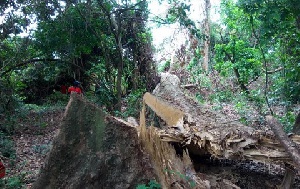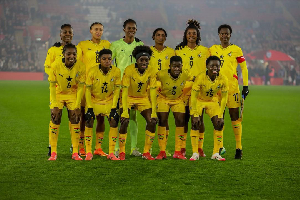The Forestry Commission, in partnership with the Kwame Nkrumah University of Science and Technology (KNUST) and Ecometrica has officially launched the Forest 2020 project in Ghana.
The project seeks to address technical barriers across six countries to the sustained implementation of effective forests monitoring systems, capable of measuring forest change and providing information on the risk and drivers of forest loss.
Ghana, Brazil, Colombia, Indonesia, Mexico and Kenya are the countries participating in the project being funded by UK Space Agency’s (UKSA) International Partnership Programme (IPP).
The project is expected to fill key forest monitoring gaps and also develop a common monitoring system that will feed into the national forest monitoring system and be used for all forest-related programmes and projects in the country to facilitate the implementation and spatial monitoring of major forestry sector programs such as REDD+, Voluntary Partnership Agreement and plantation development.
Mr John Allotey, the Deputy Chief Executive Officer of the Forestry Commission, who launched the project, said the five-year programme was designed to partner UK space expertise with government and organisations in the emerging economies.
He said despite the frameworks which have been developed to help countries protect and restore their forest resources, inadequate monitoring systems remain a barrier to effective implementation.
Forest 2020, he indicated, had been designed to address these technical challenges.
Mr Allotey said the project would address the technical barrier that affected the sustained implementation of effective forest monitoring systems capable of forest change and providing information on the risks and drivers of forest loss.
Ghana is currently implementing the Reducing Emission form Deforestation and Forest Degradation (REDD+) Programme, which is aimed at recording the country’s ability to cut down emissions and claim carbon credits.
Mr Allotey said to achieve that, there must be an accurate and transparent way of reporting on the state of the country’s forest resources.
The project is expected to help reduce the 165,000 hectares, which is lost annually to deforestation.
Ghana has so far received £ 1.2 million for the project.
A key component of the programme is to identify innovative ways that space technology can be used to improve forest management and conservation.
Three ecological areas, which meet the criteria for the project, including coastal ecosystem monitoring, forest reserve loss and associated threats of deforestation and degradation and reforestation efforts in the country have been selected for a pilot.
They are the Goaso-Offinso-Nkoranza-Techiman triangle noted for cocoa and the cultivation of other tree crops; the mangrove landscape in Ada, Keta, Songhor RAMSAR site and areas along the Elubo stretch from Takoradi.
The project would check the extent of the mangroves and monitor the changes in the landscape over time, as well as the landscape under persistent cloud cover across the south western portion of Ghana with the aim of increasing the accuracy of mapping of the land cover in these areas.
Dr Ernest Foli, the Project Co-ordinator, said the project would be able to distinguish tree crops from natural forest to accurately estimate deforestation and forest degradation caused by the cultivation of tree crops.
“There is also the possibility of real-time monitoring of deforestation (or even degradation using satellite information), risk mapping in relation to the problem of fire,” he added.
General News of Friday, 28 July 2017
Source: ghananewsagency.org













